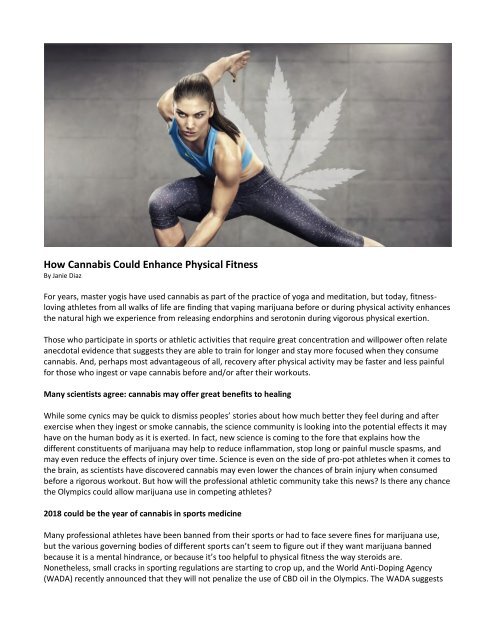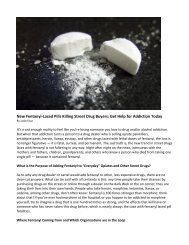How Cannabis Could Enhance Physical Fitness_Janie Diaz
Could marijuana be a boon to the health and fitness industry? Some cannabis pundits think so. This closer look into how cannabis works for working out, written by Janie Diaz, explains the benefits of using lower doses of cannabis while working out, and what the benefits may be.
Could marijuana be a boon to the health and fitness industry? Some cannabis pundits think so. This closer look into how cannabis works for working out, written by Janie Diaz, explains the benefits of using lower doses of cannabis while working out, and what the benefits may be.
Create successful ePaper yourself
Turn your PDF publications into a flip-book with our unique Google optimized e-Paper software.
<strong>How</strong> <strong>Cannabis</strong> <strong>Could</strong> <strong>Enhance</strong> <strong>Physical</strong> <strong>Fitness</strong><br />
By <strong>Janie</strong> <strong>Diaz</strong><br />
For years, master yogis have used cannabis as part of the practice of yoga and meditation, but today, fitnessloving<br />
athletes from all walks of life are finding that vaping marijuana before or during physical activity enhances<br />
the natural high we experience from releasing endorphins and serotonin during vigorous physical exertion.<br />
Those who participate in sports or athletic activities that require great concentration and willpower often relate<br />
anecdotal evidence that suggests they are able to train for longer and stay more focused when they consume<br />
cannabis. And, perhaps most advantageous of all, recovery after physical activity may be faster and less painful<br />
for those who ingest or vape cannabis before and/or after their workouts.<br />
Many scientists agree: cannabis may offer great benefits to healing<br />
While some cynics may be quick to dismiss peoples’ stories about how much better they feel during and after<br />
exercise when they ingest or smoke cannabis, the science community is looking into the potential effects it may<br />
have on the human body as it is exerted. In fact, new science is coming to the fore that explains how the<br />
different constituents of marijuana may help to reduce inflammation, stop long or painful muscle spasms, and<br />
may even reduce the effects of injury over time. Science is even on the side of pro-pot athletes when it comes to<br />
the brain, as scientists have discovered cannabis may even lower the chances of brain injury when consumed<br />
before a rigorous workout. But how will the professional athletic community take this news? Is there any chance<br />
the Olympics could allow marijuana use in competing athletes?<br />
2018 could be the year of cannabis in sports medicine<br />
Many professional athletes have been banned from their sports or had to face severe fines for marijuana use,<br />
but the various governing bodies of different sports can’t seem to figure out if they want marijuana banned<br />
because it is a mental hindrance, or because it’s too helpful to physical fitness the way steroids are.<br />
Nonetheless, small cracks in sporting regulations are starting to crop up, and the World Anti-Doping Agency<br />
(WADA) recently announced that they will not penalize the use of CBD oil in the Olympics. The WADA suggests
they are making this change—effective for 2018—because in their view, CBD oil has pro-health benefits with<br />
little to no effects on the mind or its functions.<br />
More and more, retired and professional athletes are coming out with their stories about the efficacy of<br />
cannabis on injuries and pain management. Additionally, many more athletes are suggesting cannabis is a great<br />
alternative to opioids for pain because it provides as much or more relief without the worry of addiction that<br />
affects hundreds of thousands of people in the U.S. The long-term effects of marijuana use are thought to be<br />
minimal when compared to those of hydrocodone or oxycodone, for example. Football players who have to<br />
consider the potential effects of concussion and concussion treatment are more frequently coming out in favor<br />
of alternative treatment with cannabis.<br />
<strong>Could</strong> cannabis be part of sports medicine in the future?<br />
For now, there have not been any clinical trials to test the efficacy of marijuana on inflammation, its healing<br />
properties, or to prove its effects during or after exercise and use of cannabis, mainly because marijuana isn’t a<br />
scheduled pharmaceutical. <strong>How</strong>ever, when used in smaller doses than the average person would consume<br />
recreationally, cannabis is already thought by many scientists to help with pain tolerance and the discomfort<br />
associated with working out or during recovery after a workout. So, if you're looking to enhance your endurance<br />
in the gym or around the track, cannabis in smaller doses may help you focus on your goals rather than where it<br />
hurts. This does not mean to continue working out when you have a serious injury. Rather, it means you could<br />
be mentally sharper and better able to push through tolerable pain associated with normal discomfort you may<br />
experience when pushing yourself harder. For that, cannabis may be just what the sports doctor ordered.

















